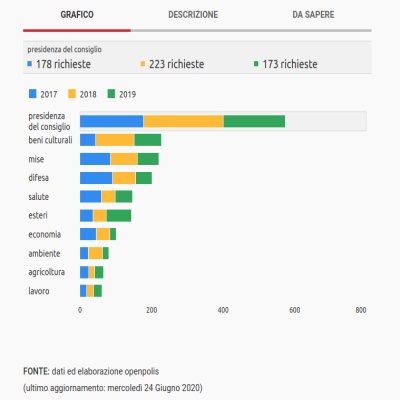How is FOIA doing in Italy?
Freedom of Information Act, you say? It could be more usable if…

(this post comments the main points of the current issue of the Openpolis newsletter)
As of September 2020…
Italy has three different, sometimes overlapping laws that regulate access to acts and data by national and local Public Administrations (PAs). A concrete “Freedom of Information Act”, that is the official acknowledgment that every citizen could ask for already existing documents, data and information without justifying the request, arrived in 2016. And that is when things become interesting.

Between 2017 and 2019, says the newsletter, there were 1.827 FOIA requests to government ministries, summarized in the chart above. Most of them were addressed directly to the Prime Minister’s Office, followed by the ministries for Cultural Heritage (“Beni Culturali”), Economic Development (“Mise”, formerly “Economia”), Defence (“Difesa”) and Health (“Salute”).
Only 63% of those requests to the central government where fully accepted, which is not necessarily a bad sign. As for their number, is 1827 requests too few or too many? Personally, I confess I have no idea. Never mind. It is much worse, as the newsletter notes, that in 2019 38% of italian public authorities do not disclose how many FOIA requests they received, and how they handled them.
Even more relevant is another number, -24%: from 2017, when the italian FOIA law came into effect, to 2019, FOIA requests to the central government decreased 24%.
Transparency promises are useless if…
The newsletter describes this decrease in FOIA requests to italian ministries as “a symptom of the difficulties in using this new tool. Making a Foia request to a public administration is much more complex than it appears. This is a new law and PA practice, that is still missing consolidated jurisprudence, and until this is the case, it takes not negligible economic and legal resources, or skills, to ensure that a FOIA request is successful”.
Personally, I consider this decrease as another symptom of a larger, meta-issue, which I note in this post as a public service warning: FOIA is good and necessary, and so are open data and active citizenship that uses them. But if the laws and processes themselves that FOIA requests and corresponding laws and obligations are not designed to be, so to speak, “FOIA-ready”… any FOIA act will be a lame duck.
Who writes this, why, and how to help
I am Marco Fioretti, tech writer and aspiring polymath doing human-digital research and popularization.
I do it because YOUR civil rights and the quality of YOUR life depend every year more on how software is used AROUND you.
To this end, I have already shared more than a million words on this blog, without any paywall or user tracking, and am sharing the next million through a newsletter, also without any paywall.
The more direct support I get, the more I can continue to inform for free parents, teachers, decision makers, and everybody else who should know more stuff like this. You can support me with paid subscriptions to my newsletter, donations via PayPal (mfioretti@nexaima.net) or LiberaPay, or in any of the other ways listed here.THANKS for your support!